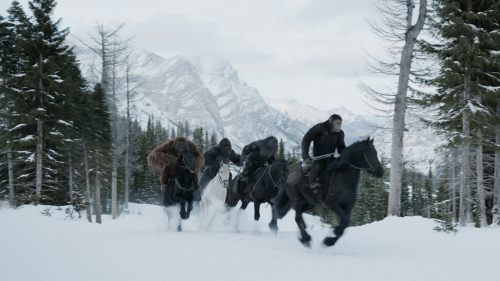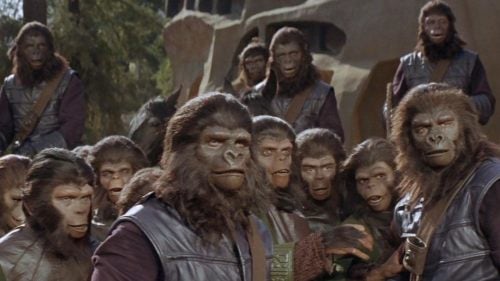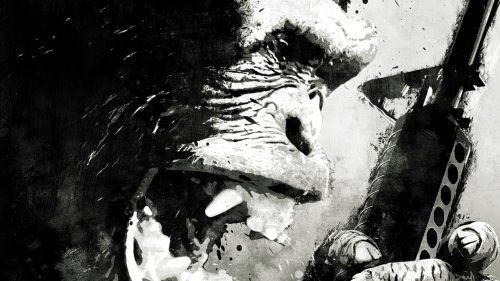WAR FOR THE PLANET OF THE APES: Failure To Communicate
Spoilers for War for the Planet of the Apes
That War for the Planet of the Apes exists as a product of the American studio system feels like something of a miracle. Which is neither to say its brand name would’ve ever prevented another entry – it’s the ninth film in the franchise (the second by Matt Reeves) and its fifty-year legacy speaks for itself – nor that it’s the first Apes film to be overtly political, but rather that the specifics of its overtness are the most direct indictment of American nationalism in recent Hollywood history, even in a year that gave us Kong: Skull Island and, would you believe it, xXx 3. On one end of the spectrum we find the tribal instincts of American militarism, as the film conflates it with distinctly white nationalism-esque preservation of culture. On the other, those who live under its flags, its anthems and its boot-heels as both scorned minority and necessary labour force, but what separates these groups more than anything is neither uniform nor ideology.
It’s their willingness to communicate.
In War, as in most mainstream post-apocalyptic cinema, America is the proxy for all of humanity. The setting is American, the human characters are American, and even the apes, having learned to speak from American humans, speak with American accents. This isn’t much of a leap for an American series set in the United States, but it becomes more than just a default setting for a film in which the Star-Spangled Banner is inscribed with “Alpha” and “Omega” and its eponymous anthem is a rallying cry for physical violence. “We are the beginning, and the end!” yell these American soldiers, worshipping a Colonel who emerges beneath the graffitied stars-and-stripes shaving his scalp like a skinhead, their walled-off stronghold now the be-all and end-all of humanity as they see it. They act without empathy. They speak, but in platitudes. And they execute those among them who lose the ability to sound out words.
The opening minutes of Dawn of the Planet of the Apes (2014) take place entirely in sign language. Its opening hunt sees Andy Serkis’ Caesar, a revolutionary figure and the apes’ hyper-intelligent leader, running alongside his subjects. His general, Luca the gorilla, carries weapons and supplies on his back; Caesar reaches for them effortlessly as the duo charge toward their targets in tandem. In contrast, the opening minutes of War place us in the human perspective of Dawn’s oncoming conflict. The apex of that film’s escalation is a constant here – the first image that comes into focus is the words “MONKEY KILLER” inscribed on a soldier’s helmet – as the military’s “donkey,” a traitorous red ape acting in self-interest fulfills the same role as Luca. Only every time a soldier needs to access his pack, he yanks the gorilla downward with force, and even the most seemingly understanding among them (a preacher!) chooses duty over empathy at all times, despite being spared by Caesar.
The apes are far from perfect, of course. Red and Winter trade in their own kind for a shot at safety-through-servitude, and Caesar ignores leadership responsibility as he embarks on a revenge mission against the maniacal Colonel, thus aligning himself with the looming spectre of Koba, a warmongering ape consumed by hatred. The Colonel is consumed by a similar hatred, though rather than the focus being a singular ape, it’s all of ape-kind that’s his enemy. He is Dawn’s Carver (Kirk Acevedo) with power, a dead son in his past like Dreyfus (Gary Oldman), but a son whose death cocooned him from empathy. Where Dreyfus breaks down in front of pictures of his kids, The Colonel delivers an ableist and borderline eugenicist monologue that forms the crux of his motivation.
This speech is entirely an exposition dump, and a scene largely maligned by even those who admire the film (perhaps rightly so), but it forms a vital linchpin in the narrative for Caesar, whom the film keeps cutting back to as The Colonel speaks. It’s a scene that, regardless of whether or not it halts momentum, demands a tell-not-show approach. It’s the weight of the Colonel’s words, the disdain in his voice as he talks about his son once he lost his speech, that triggers Caesar’s horrified reaction (which may very well be the finest example of motion-capture acting in the technology’s history). We, like Caesar, are denied empathy for The Colonel and his experience at this stage in the film. If he comes off as a two-dimensional cutout in this moment, it’s a terrifying cutout regardless owing to Woody Harrelson’s ability to speak through his eyes, broadcasting a hateful message on multiple wavelengths. When he is afforded empathy, it’s entirely through non-verbal means; using his ability to communicate to neither subjugate nor call his men to violence, but to beg for empathy itself.
Where the humans are free to speak to one another, barriers of communication are ever-present amongst the apes. Caesar and a handful of others can speak. Most seemingly can’t, or exert too much energy in doing so (Maurice utters but a single word across both prior films: “Run.”) This time around, both their sign language and their instinctive, non language-based communication is subtitled, allowing us to understand them, and more importantly, to understand the fact that they understand each other. When zoo escapee Bad Ape (Steve Zahn) – whose very name comes from the verbal cruelty shown to him by people – and mute human Nova (Amiah Miller) first enter the picture, Caesar is able to translate Maurice and Rocket’s sign language for them. But once the messianic figure begins to walk his own path, one of selfish, all-consuming vengeance, they must work to re-establish their connection.
The consequence for a humans’ inability to speak is execution. The rationale may be preventing the spread of a virus that eventually turns them “primitive,” a state we’re told about yet never actually see in the film, but it’s the three living humans we encounter in the initial stage that are framed with a lens of sympathy. Nova, whom Maurice decides to care for despite Caesar’s cold shoulder, the dying soldier whom they come across, and eventually The Colonel, whose seeming drunken scramble and his son’s alcohol-soaked photograph work to humanize him, mixing familiar elements before he even re-appears on screen. In his eyes, we see the same primitive knowingness he spoke of. The same longing for understanding he once turned against, crying out for a mercy killing. It’s in the denial of this mercy, turning The Colonel’s own tools against him, that Caesar exacts his revenge – despite understanding its impact on his soul.
Conversely, Maurice, Nova and Bad Ape execute their ape-breakout by learning to communicate. Maurice teaches them to sign – both American Sign Language, and the simian slogan of “apes together strong” – and at a pivotal moment of Nova questioning her self-identity, he makes the effort to verbalize his protective instincts and gives the little girl a name.
With minor exception, the humans are cold. They express only their fear of and anger towards the apes, backed by symbols of nationalism as they re-enact the worst parts of human history (in this case, scenes ripped right out of American slavery). The apes on the other hand, emote. They feel deeply, for their own circumstances and for each other, and they’re allowed to communicate with the audience in a way the human villains are not. Whether verbal, ASL or through devastating expression, it’s the understanding we have of them, and the understanding they have of each other amidst gut-wrenching physical and emotional hardship that separates us, the audience, from the humans on screen, humans who refuse to recognize the suffering they might share in a similar circumstance, but maintain the fear of being put in said predicament.
“So emotional!” derides The Colonel, as he praises Caesar’s intelligence, with supposed pragmatism taking precedence over his ability to recognize pain. He is mechanical in his machinations, like so many who demand stoicism a la “logic and reason!” as they deny impassioned claims of human suffering, valuing the words being spoken, and the symbols being raised infinitely more than the meaning behind them.
No humans are redeemed in War for the Planet of the Apes as they were in the prior films. Not until they’re stripped of their power to inflict and incite cruelty through words, making them “less than human” in the eyes of soldiers, but even more so within the film’s moral framework, as the rare extreme close-ups humanize their every glance and every affectation. The film’s homo sapiens are the very worst of us, letting symbols and ideas dictate their actions more than understanding the “other" – the human paradox of being able to speak, yet spelling out our doom by refusing to communicate. The apes however, are our best selves, working together despite the chasms of language and ability, towards a better future for all.
Apes. Together. Strong.



